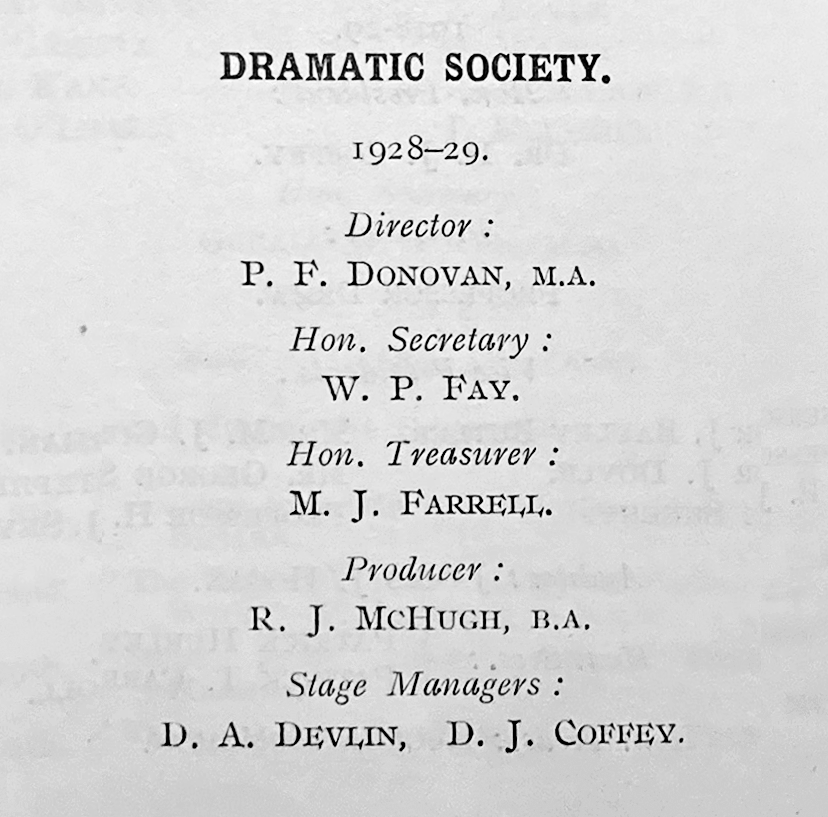Founding the Dramatic Society (1928)
The committee of the first session of the UCD Dramatic Society
:
1928-1929 (1st Session)
Director: P. F. Donovan
Honourary Secretary: W. P. Fay
Honourary Treasurer: M. J. Farrell
Producer: R. J. McHugh
Stage Managers: D. A. Devlin & D. J. Coffey
Robert Dudley Edwards (Auditor, L&H, 1929-1930; Chair of Modern History, UCD 1944-1979)
“In another direction not this year may be picked out as memorable. Under the influence of Ernie O'Malley, Michael Farrell, Florrie Lynch, and Roger McHugh, the [L&H] committee agreed, on 21st March, 1928, to hold an extraordinary general meeting for the purpose of launching a Dramatic Club. The project having been endorsed by the Society, the Club was duly launched. Having secured presidential sanction, it transformed the Aula Maxima in Stephen’s Green which was for this purpose provided for the first time with electric lighting and a series of plays were publicly presented.”
Mervyl Wall (Writer; Programme Officer, Radio Éireann, 1948–57; Secretary, Arts Council 1957–75)
“I was a student of the College for some years before I joined the Literary and Historical Society, and it was just before my membership that a small drama group was formed within the L. & H. My recollection is that the president of the College, Dr. Coffey, rather resisted the formation of a Dramatic Society and that this group within, and financed by, the L. & H. was the thin end of the student wedge. The group, led by Ernie O'Malley, acquitted itself so well, however, that presidential permission was given in the following year, and a fully-fledged Dramatic Society came into being. Paddy Donovan became director; he was succeeded by Donoghue Coffey, and I came third. My own directorship was a troubled one. I resigned after a disagreement with Dr. Coffey as to the Dramatic Society's right to choose itself the play for its annual public production. The Importance of Being Earnest had been suggested, and Dr. Coffey referred our choice to the professor of English Literature, who reported unfavorably, saying to me that he did not think it proper that the students should go out under the banner of Oscar Wilde. We then proposed a play called Winterest, which was all about Vikings and similar husky characters with wings on their helmets, but Dr. Coffey imposed a veto, partly because he thought that the play would not be a commercial success and partly because he thought that influence outside the college was being exercised upon us in the choice of play. I believed the issue of freedom for the Dramatic Society to be an important one and resigned from the directorship and from the Society. ‘Follish young man’ was Dr. Coffey’s comment. As it happened, The Importance of Being Earnest was the play accorded presidential approval in the end, and it was put on some months later at the Gate.
Those couple of years during which I was with the Dramatic Society were, however, of the greatest value to me, as without them I might never have discovered in myself the urge to creative writing. We had great fun too messing around in our one little room at the top of the stairs in 86, and doing wonders with the one electrical point which the College allowed us. Roger McHugh was a very active producer and put on Twelfth Night night with Hilton Edwards to assist. Roger made an excellent Malvolio and Florrie Lynch played Maria. Dennis Devlin was Feste and I spoke Valentine's nine lines with dignity and afterwards stood round in the background with my arms folded as and when instructed to do so. I remember one bright afternoon when we entertained Sir Frank Benson and his company to the in the Council Chamber, and I remember Cyril Cusack and Brian O'Brien as valuable members of my committee. Cyril had just come to college and was a frequent attender at the L. & H. We knew him to have come of a family with a great acting tradition and taught him a great acquisition to the Dramatic Society.
I remember much else of the same society, of friends the news of whose debts, nearly all before they reached the age of thirty, with each time like a blow to the heart – Nora O'Keefe, Niamh Fitzgerald, Peter O’Hagan, Tim O'Hanrahan and the L&H Auditor, John Kent; But perhaps I am letting my own particular interest in the dramatic society carry me away. I hope, however, that the U.C.D. Dramatic Society whenever it finds itself naming with pride the dramatists, producers, scene designers and actors whom it has given to the Irish theater, will always remember that it stems from the older society. It was the L&H which supplied the twigs and made the nest, gave birth to, and watched the fledgling until it was strong enough to stretch its wings.”
Extraxts from: Centenary History of the Literary and Historical Society 1855-1955, edited by James Meenan (2005 Edition)

